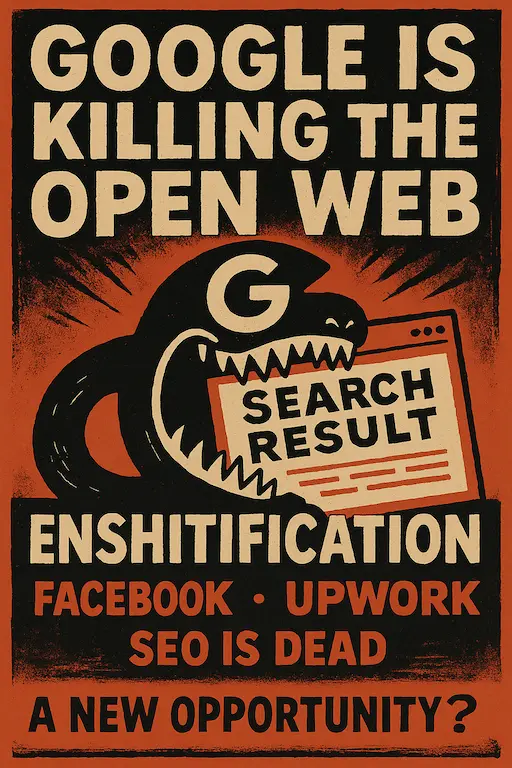I’ve always seen technology as a kind of magical peephole. Not just a tool, but a sociological telescope — a window into what’s coming, long before the rest of the world catches on. An accelerant of truth, if you will. And what we’re seeing now? It’s not exactly pretty. But it’s crystal clear.
Welcome to the age of enshitification.
What the hell is “enshitification”?
It’s a term made famous by Cory Doctorow, and yeah — it’s as ugly as the thing it describes. “Enshitification” is the predictable lifecycle where once-beloved platforms turn to absolute crap. Not just disappointing. Crap, in the sense that they rot from the inside out. They betray their users, exploit their communities, and chase profit at the cost of absolutely everything else.
The cycle is always the same: attract → trap → exploit.
Need examples? Here’s a quick greatest hits:
- Facebook: From social network to dopamine casino and echo chamber extravaganza.
- Upwork: From freelancer haven to algorithmic gladiator pit where people fight to the death for scraps.
- Amazon: From shopping marvel to landfill of knockoffs and shady listings.
- Instagram: From digital gallery to influencer strip mall.
And just when you thought it couldn’t get worse… enter Google. This isn’t just a slow decay. This is a takeover.
Google: The Web Belongs to Me Now
The 2025 edition of Google I/O was a masterclass in algorithmic hubris. The headline? “We’re making it easier for users.” And by “users,” they don’t mean creators, developers, or the people who’ve spent two decades building the web. They mean consumers. Everyone else is collateral.
The big reveal? Google’s not just indexing the web anymore — it’s replacing it. With Gemini, their deeply integrated AI assistant, Google is now crawling your site… only to generate its own answers in the search results.
Translation: why send people to your site when I can give them a neatly packaged, AI-written response — based on your content — with zero credit or traffic back to you?
That’s not optimization. That’s extraction. That’s large-scale looting. And it’s all done under the friendly glow of “improving user experience.”
SEO is Dead. Long Live Humans.
So yeah, we can officially say it: SEO is dead. But let’s be honest — it’s been dying for a while.
We’ve spent years writing for Google, not for people. Chasing keywords, obsessing over bounce rates, trimming down content for speed, tagging every pixel to stay in Google’s good graces. We turned our sites into soulless efficiency machines, thinking we were playing the game.
Turns out, we were feeding the beast.
And now that the beast has learned everything it needs from us, it’s cutting us out of the loop.
But here’s the twist: this death might be the best thing that could happen. Because now we get to unlearn. We get to build again — for humans, not bots. We can design web experiences as places to explore, not funnels to convert.
Back to Basics
What does that actually mean? It means maybe, finally, we can:
- Write without keyword anxiety.
- Design without thinking about bounce rates.
- Build interfaces that engage, not manipulate.
- Choose authenticity over performance metrics.
- Create digital spaces with character, not just ranking potential.
Because the one thing we sacrificed on the altar of SEO? Joy. The joy of discovery. The joy of reading something unexpected. The joy of being surprised by a strange, beautiful idea.
And you know what? AI can’t fake that. It can mimic it, sure. But real emotion, real humanity — it can’t generate that on command. That comes from lived experience. From you.
The Web Doesn’t Belong to Google
We need to repeat this like a mantra: the web does not belong to Google.
It’s a collective space. A layered, chaotic, messy, beautiful archive of culture, stories, weirdness, and wonder. And it’s ours to protect — not by obeying Google’s rules, but by making our own.
Google wants to kill the hyperlink? Fine. Let’s build apps that make connections central again. Google wants to generate all the answers? Let’s build spaces that ask the right questions. Google wants to hijack attention? Let’s create interfaces that actually deserve it.
Maybe the future of the web isn’t about more tech — maybe it’s about more presence. Experiences that feel shared, not optimized. Pages that feel like moments, not dashboards.
The Shit is the Signal
Enshitification is a curse. But every curse carries a hidden choice.
It can either trap you — or push you to take another path.
So yes, the web we knew might be dying. The SEO-optimized content mills. The clickbait tutorials. The listicles and backlink farms. That world sold out. And now, it’s being devoured by the same machine it fed.
But maybe that’s a good thing.
Because now we can build something different. Something less sanitized. Less predictable. Less Google-friendly.
And way more human.
